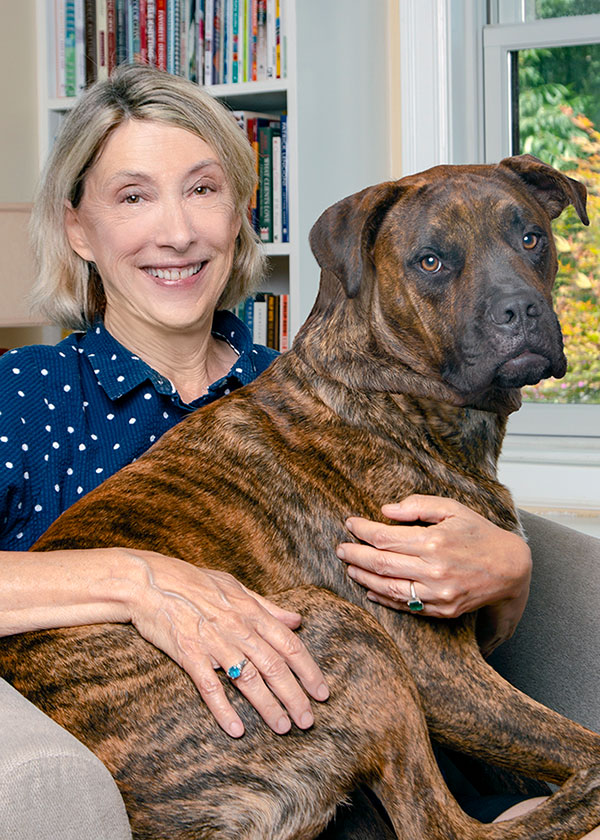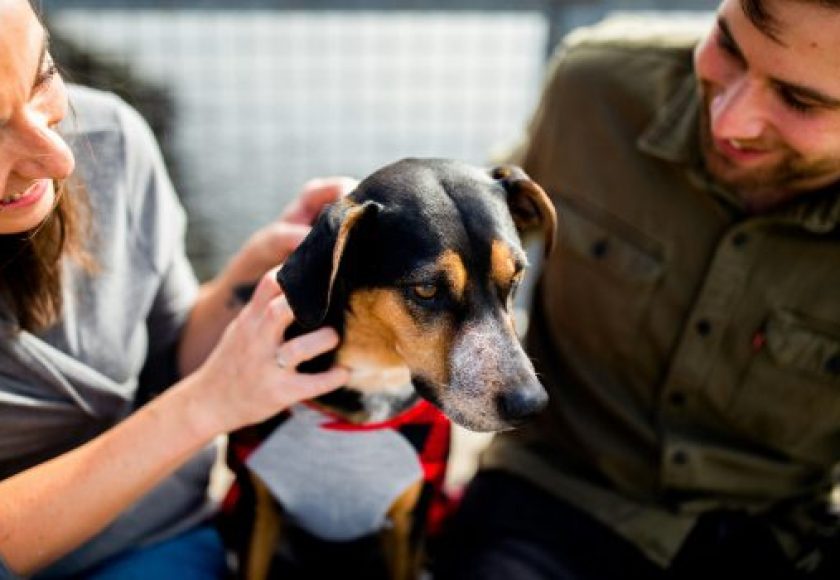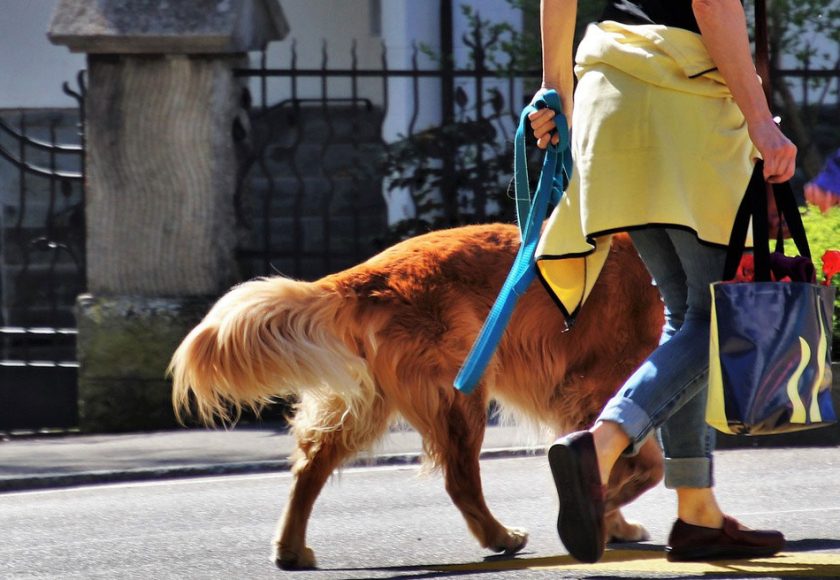First: Our words of caution to you:
Finding a dog capable of being a service dog is an extremely difficult task. We have a 40% success rate with the pups our Head Trainer carefully chooses. He assesses a lot of dogs to find the very special pups he selects for us. Service dog schools that breed their dogs spend a LOT of money trying to create the perfect service dog through selective breeding. Their success rate is generally 25-33%. You can’t train a dog to become an effective service dog if the dog doesn’t have the required temperament and skills.
If you adopt a puppy, fully guessing who a dog will be as an adult isn’t possible. Also, during the time you’re raising the pup, if a traumatic incident happens to the pup, that can destroy the pup’s ability to be a service dog If you adopt a dog to be your service dog, you may end up with a pet dog, not a service dog.
Before choosing a service dog puppy, you’ll want to think about your specific needs and what you’ll need the service dog to do for you. The most critical and first step to choosing a puppy for a service dog is understanding your own needs and capabilities. There are also some very specific characteristics to consider when looking for the perfect pup to train as a service dog.
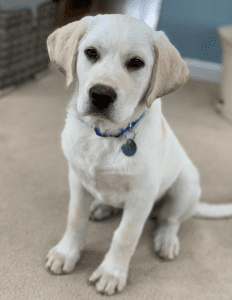
4 Things We Look for When Choosing a Puppy as a Service Dog
Just like humans, dogs can have a wide array of temperaments and personalities. This makes it important to take selecting a puppy as a service dog seriously. No matter how much you prioritize socializing a dog, some dogs just are not meant to be service dogs. To ensure a puppy becomes a great service dog, looking for certain qualities is essential.
1. A dog that is socially balanced.
Service dogs need to be okay around people, but not one that’s too needy – soliciting attention and pets. At the same time, the pup should not be too leery of strangers or uncomfortable around them. It’s important that they be comfortable in large crowds or if a stranger does reach out to pet them with no warning. They should be okay if a child is running around near them. People are going to come into your dog’s space, and they need to be used to that. If there is an emergency, the dog will need to be okay with a stranger handling him. You’ll have to do a lot of socialization of your dog to introduce him to all types of people, and large numbers of people. Service dogs should be balanced, calm, and unflappable when it comes to social settings. It is part of their training to teach them not to pay attention to anyone but their handler (you) but they should not be naturally fearful of other people.
2. A dog that is confident.
A service dog will need to be able to work in all types of settings, so they must be confident. Think of your own needs; you can’t focus on work if you are fearful and constantly worried about being in danger. A service dog needs to be responsive and attentive to your needs and changes in behaviors or smells, so their nervous system shouldn’t always be on high alert. Service dogs should be confident enough to be at ease in most situations. They may get spooked occasionally, but they should be able to recover quickly. A pup that takes too much time to adjust when placed in a new situation and is generally shy or anxious when in a new place is not a good candidate for a service dog. You’ll have to socialize your dog to a lot of new situations when you’re training him to be a service dog.
3. Dogs should be personable.
A puppy that is too independent will be difficult to train to be sensitive and attentive to their person’s needs. It’s best to have a dog that likes to stay close to you, so they can react if you have a change in mood or smell. They also need to be aware of any behavioral changes. You will get better results with dogs that want to stay close. Breed differences can influence a dog’s behaviors and natural tendencies to focus on their person. Dogs that were bred to work alongside a person will be a better choice for a service dog than a breed that was bred to spend time alone herding sheep.
4. Service dogs should be easily motivated.
Training can improve a dog’s motivation, but if a dog lacks a work ethic, and prefers to snooze or play with a toy, you can’t fully counteract that temperament with training. There are two basic ways to get a dog to perform. There are unpleasant consequences for a dog that doesn’t do what they are asked, including a leash pop, harsh tone of voice, or physical pressure. Punishing, hurting, or scaring the dog while training it can turn it aggressive out of defensiveness. A service dog CAN’T be aggressive. Positive consequences reaffirm good behaviors and might include a treat, a toy, playtime, or something else the dog finds enjoyable. You need to find a good balance in training strategies so that we can help decrease your dog’s stress while building its confidence through its successes. Service dog puppies are quick to put out effort for a treat! They should be easy to motivate, which makes them easier to train.
- Service dogs should be focused, and hard working dogs. We usually release a pup from our training program because it lacks focus, or a work ethic.
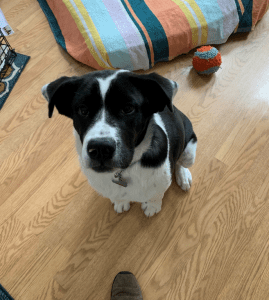
5 Traits That Make a Good Service Dog
Service dogs perform very important tasks for their person. They have to undergo extensive training to do specific tasks to provide the assistance their person needs. Most dogs can be trained, but it’s essential that a dog have some key traits that make them trainable and able to work with their person. There are certain traits that help make a good service dog. Here are some essential characteristics we look for when choosing a service dog puppy.
1. Age of the Pup
When evaluating potential service dogs, it’s important to consider its age. Puppies learn easier and faster than grown dogs. You can avoid a lot of problems if you adopt a young dog, before they’ve encountered trauma(s) that mark their personality. For the most part, we consider dogs from just a few months of age up to 2 years old. Because the training of service dog is usually 2 years or so, the working life of an older dog is significantly shorter.
2. The Dog’s Health and Structure
A potential service dog puppy shouldn’t have any obvious health issues or concerns. The dog should appear to be healthy and active without things like weepy eyes, sores, poor coat, or gunky ears. Depending on the breed, a dog can shed, but there shouldn’t be any bald spots in their coats. There also shouldn’t be any growths, bumps, or lumps. If the dog is overweight, figure you’ll put the dog on a diet immediately! Skeletal or muscular injuries, under the advice of a vet, may be grounds for eliminating that pup.
A service dog needs to be able to move and run freely. We look at their natural gait, movement style, and how they look while just being themselves. Their gait shouldn’t have any limping, lameness, or oddity. The dog’s back should be straight, and the shoulders should have good angulation, so that their natural movement isn’t inhibited or limited. The rear end of a dog should be well-muscled and should visibly be seen to “drive” the dog as they run. Flatter skulled dogs like boxers, bulldogs, and some toy breeds are not usually a first choice because they have a tendency toward breathing issues and fragile physiology.
3. Noise Levels
The first two things to check when passing by a dog’s kennel are the noise level and cleanliness. A dog who naturally keeps a clean space and who tends to have a quieter nature are good candidates. Service dogs should be somewhat invisible when they are working. They shouldn’t make a lot of noise unless they are trained to as part of their work responsibilities. Then, they should only perform on cue. If you walk quietly through the shelter or kennel, you may notice one or two dogs that are not joining in with all the other noise but are quietly relaxing in their space. That’s a characteristic of a dog who is able to remain relaxed in the middle of chaos, has a high tolerance for distractions, and is able to settle naturally.
Can I Choose the Puppy to Work With as a Volunteer Raiser?
If you decide to raise a puppy for Putnam Service Dogs as a Volunteer Puppy Raiser, our trainers match a puppy with each raiser, based on the raiser’s home setting, and the pup’s temperament, energy level, and expected mature size.
Are you interested in becoming a service dog puppy raisier? Do you or someone you know need a well-trained service dog? Contact us at Putnam Service Dogs to learn more about our programs!
